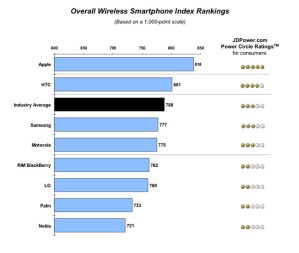
J.D Power and Associates has released its 2011 studies assessing consumers’ overall satisfaction with both smartphones and traditional mobile handsets—and the overall rankings contain few surprises, with Apple showing a strong lead in the smartphone category (with HTC the only other company to beat the industry average), while Samsung just barely edged out LG and Sanyo to claim top honors in the feature phone category. Overall, consumers showed much higher levels of satisfaction with smartphones than with traditional mobile handsets.
However, it’s almost more interesting to note what companies ended up at the bottom of the heap: amongst smartphones, Nokia devices ranked even lower in satisfaction amongst U.S. consumers than Palm/webOS devices, and in feature phones only Kyocera ranked lower than Nokia. And Google’s latest big acquisition—Motorola Mobility—didn’t even beat the industry average in either category.
“It’s not unexpected that satisfaction is higher for devices that have new technological advances or features,” said J.D. Power and Associations senior director of wireless services Kirk Parsons, in a statement. “Having the right combination of physical dimensions and operating functions and features for both smartphones and traditionally equipped devices is key to creating an exceptional ownership experience with each type of wireless device.”

The study found several factors directly impacted customer satisfaction with smartphones: J.D. Power found that consumers are more satisfied with phones that are lighter, thinner, and offer touchscreen control rather than QWERTY keypads or a mix of touchscreen and QWERTY keypads. Consumers also prefer fast processing speed, high-quality displays, and the resolution of a phone’s camera is also a contributing factor. In general, the more megapixels a phone’s camera offers, the higher a customers’ satisfaction will be, although the cutoff is about 5 megapixels: customers weren’t significantly more satisfied with 8 megapixels or more than they were with 5 megapixels.
J.D. Power also found U.S. consumers are very satisfied with 4G-enabled devices, with the average satisfaction of 4G users significantly higher than that of 3G users; the study also found 4G users are more active users of their devices, engaging in more calling, texting, and Internet use.
The 2011 results mark the sixth consecutive time Apple ranked highest amongst smartphone manufacturers for customer satisfaction.


